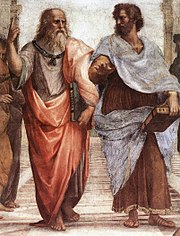Judging Pluto
Well, I'm told that I make sense, but I wonder.. I hope that by making sense, I am not being unwise :) After all, I'm slicing the world into pieces. My piece is logical, based on the classical 76 year old definition of Pluto, and by using the precise language definition of the word 'planet'. Yes, it is a nonluminous celestial body larger than an asteroid or comet, illuminated by light from a star, such as the sun, around which it revolves. By that definition Pluto is a planet. If there are other bodies that fit this definition, then I say, 'let's add them' to the list of planets.
I think it was Aristotle who was one of the first who concerned himself with the dividing of the world into slices. He would take his metaphorical knife (language and scientific description), and for every category or every group, he would try to form rules that would divide one group from another. Sometimes we humans do too much of this categorization. Perhaps the divisions can be more subtle. Who is to say these scientists are right or I and the dissenters are correct (Pluto vote 'hijacked' in revolt). It is fun to have the debate, but I must not get too carried away with my attempt to be precisely correct, lest I be wrong.
 Nature has it's own way of being omnipresent, subtle and constructed in her own manner; being what she is, she is there, and our models, language, descriptions, scientific or otherwise are only too imprecise, and break down again and again, yet we try to build them back up again; and when they break down, we ought not be surprised in our infinitesimal attempts to understand or model the ultimate world of nature, but we try. Our representations are to nature as an atom is to the sun, only very minute piece of the entire puzzle.
Nature has it's own way of being omnipresent, subtle and constructed in her own manner; being what she is, she is there, and our models, language, descriptions, scientific or otherwise are only too imprecise, and break down again and again, yet we try to build them back up again; and when they break down, we ought not be surprised in our infinitesimal attempts to understand or model the ultimate world of nature, but we try. Our representations are to nature as an atom is to the sun, only very minute piece of the entire puzzle.


0 Comments:
Post a Comment
<< Home